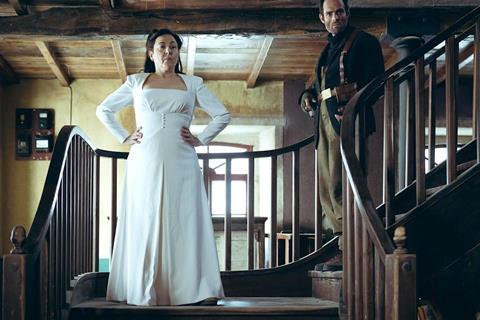Carmen Machi leads the fray in this reverse-engineered Spanish civil war shoot-’em-up

Dir: Clara Bilbao. Spain/France. 2024. 97mins
An intriguing if uneven mashup of dark comedy, anti-war satire, slasher horror, feminist fable and more, the directorial debut of Spanish costume designer Clara Bilbao is as daring and uninhibited as its remarkable heroine, and sometimes as lacking in control. This extravagant and surreal yarn of how one middle-aged woman decides to take bloody revenge, first on the opposing side and then on men in general, updates Raymond Queneau’s 1947 pulp novel pastiche to often potent, bloody effect and puts a 180-degree spin on the established tropes of the Spanish Civil War movie.
A delightfully deranged performance
Led from the front by a compellingly over-the-top Carmen Machi and opening in Spain on March 15 following its Malaga premiere, We Treat Women Too Well unspools over a single day in 1945, in a remote Spanish community. Though the war ended in 1939, the resistance went on, and the film opens with a group of maquis – anti-Francoist freedom fighters – about to make a last-ditch attempt to take over a Nationalist mountain town as they make their way to France.
Though they are a pretty useless crew, they manage to occupy the local post office, forcing diehard Francoist Remedios Buendia (Machi) who has just taken delivery of her new wedding dress ahead of her marriage to a fascist soldier, to hide upstairs. Within a couple of minutes, a jittery maqui has already killed two people with a machine gun, one from each side: many more will follow. Having taken a couple of local people hostage, the maquis hunker down while a series of subplots unfolds.
Led by their wishy-washy captain, Bocas (Isak Ferriz), who is given to unhappy introspection about the mindlessness of war and who walks around bare-chested to signal a bravura that he is clearly sadly lacking, the freedom fighters are a motley gang. Among them are Twelve (Antonio de la Torre), so called because he’s the last survivor of eleven brothers who were victims of the war; grizzled, wise Soria (Oscar Ladoire, wonderfully grumpy), slightly deranged but forever spouting prophetic truths; former dressmaker Julian (Julian Villagran); and romantic Frenchman Raymond (Nicolas Grandhomme), named perhaps in homage to author of the source novel Queneau.
Tonally the film awkwardly straddles satire and realism, but Machi’s give-it-all, tremendously physical performance goes some way to pulling it all together. As her ongoing inner monologue makes clear, Remedios is a borderline psychopath with a withering hatred of effeminate (aka Republican) men, and a vicious tongue capable of delivering some wonderfully flowery insults. (Republicans, for example, are compared to “little fleas in a goat’s beard”).
She spends much of the film being guarded, inevitably with a bad outcome for the captor; that pristine wedding dress becomes quickly stained with their blood, transforming this exemplar of Francoist womanhood into something that wouldn’t feel out of place in a giallo movie. While Machi’s delightfully deranged performance seems fitting to the crazed atmosphere of the whole, however, some of the other actors seem a little lost about whether they are in a real war movie or a darkly surreal spoof of one.
The sexual politics of Queneau’s original, in which male sexual desire becomes a weapon used by the heroine against them, is amplified and updated here – quite an achievement in a genre as traditionally gender-bound as the Spanish Civil War movie. A canny operator, Remedios manipulates not only the soldiers’ desire, but also their coded, honour-bound idea of what a “woman” should be – which, as it turns out, they have got more wrong than they could ever have imagined.
Production values are strong, with the visuals making the most of the large rooms, shadows and hidden corners of the large building in which it is shot. Remedios’ home is an accurate recreation of the grim Spanish living conditions during those impoverished years. But the obviousness of the western-tinged music is a regular letdown, coming in too often and sometimes inappropriately, disturbing the atmospherics rather than intensifying them.
Production companies: Ficcion, Noodles
International sales: Filmax filmaxint@filmax.com
Producers: Julio Casal, Mateo Gil, Mamen Quintas
Screenplay: Miguel Barros, from the novel by Raymond Queneau
Cinematography: Imanol Nabea
Production design: Curru Garabal
Editing: Ascen Marchena
Music: Nacho Masttreta, Marina Sorin
Main cast: Carmen Machi, Antonio de la Torre, Isak Ferriz, Oscar Ladoire, Julian Villagran
























